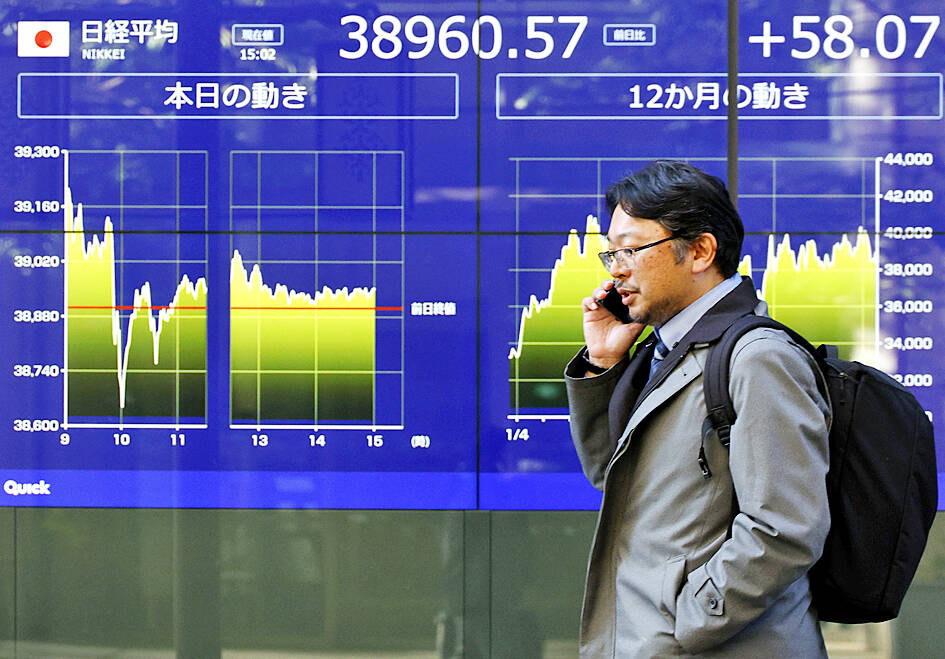Asian markets yesterday experienced big fluctuations after US President Donald Trump took office warning he could impose stiff tariffs on Canada and Mexico next month, but appeared to delay any action against China for now.
Trump’s announcement that the nation’s closest neighbors could be hit with 25 percent levies as soon as Feb. 1 also jolted currency markets, with the Mexican peso and Canadian dollar tumbling.
That lack of mention of China fanned hopes the economic superpowers would not embark on another trade dispute, with Beijing yesterday saying that it hoped the two sides could cooperate on the issue.

Photo: EPA-EFE
The TAIEX in Taipei rose 0.14 percent to 23,300.01. Tokyo, Sydney, Bangkok and Jakarta also moved up, while Shanghai, Singapore, Seoul, Wellington, Manila and Mumbai fell.
Hong Kong advanced, with embattled Chinese developer Country Garden Holdings Co (碧桂園) soaring as much as 30 percent at one point as trading in the firm resumed after a nine-month suspension. The shares closed 17.5 percent higher.
London edged up at the open, but Frankfurt and Paris slipped.
The US dollar, which had weakened across the board on Monday, bounced back against its major peers, but its biggest gains were against the Mexican peso and Canadian dollar, with the latter at its weakest since the start of 2020 during the COVID-19 pandemic.
“The new administration seems aware of the potential downsides of tariffs,” JPMorgan Asset Management chief market strategist for Asia-Pacific Tai Hui (許長泰) said. “China, Mexico and Canada remain in the spotlight for possible tariff increases. Investors may need to prepare for some whipsawing of policy announcements in the weeks ahead as the new administration settles on precise policy direction.”
For now, traders are zeroing in on a warning over currency manipulation which might spark greater volatility ahead.
A fact sheet from the new US administration that is yet to be made public has called for key federal agencies to address foreign exchange (FX) manipulation by other nations, prompting strategists to ponder who would be targeted. Japan, China, Germany and Singapore are already on the US Department of the Treasury’s “monitoring list” for currency practices.
Trump’s move comes after high US interest rates and strong growth have kept the US dollar elevated against everything from the euro to the yuan, entrenching its dominance across the foreign exchange market. The prospect of further gains in the greenback is likely to put other nations on guard and might fuel another round of intervention to prop up their currencies.
China, which is already in the cross-hairs for trade tariffs from the US, might be particularly vulnerable, strategists said.
Any new headlines on currency practices could further hurt the yuan.
“Increased US scrutiny on currency policies could pressure countries to allow more FX appreciation against the [US] dollar,” said Chang Wei Liang (張偉亮), a strategist with DBS Bank Ltd. “If there are perceptions of allowing the currencies to weaken in the event of US tariffs in future, then this could raise the currency manipulation question again.”
Additional reporting by Bloomberg

Intel Corp chief executive officer Lip-Bu Tan (陳立武) is expected to meet with Taiwanese suppliers next month in conjunction with the opening of the Computex Taipei trade show, supply chain sources said on Monday. The visit, the first for Tan to Taiwan since assuming his new post last month, would be aimed at enhancing Intel’s ties with suppliers in Taiwan as he attempts to help turn around the struggling US chipmaker, the sources said. Tan is to hold a banquet to celebrate Intel’s 40-year presence in Taiwan before Computex opens on May 20 and invite dozens of Taiwanese suppliers to exchange views

Application-specific integrated circuit designer Faraday Technology Corp (智原) yesterday said that although revenue this quarter would decline 30 percent from last quarter, it retained its full-year forecast of revenue growth of 100 percent. The company attributed the quarterly drop to a slowdown in customers’ production of chips using Faraday’s advanced packaging technology. The company is still confident about its revenue growth this year, given its strong “design-win” — or the projects it won to help customers design their chips, Faraday president Steve Wang (王國雍) told an online earnings conference. “The design-win this year is better than we expected. We believe we will win

Chizuko Kimura has become the first female sushi chef in the world to win a Michelin star, fulfilling a promise she made to her dying husband to continue his legacy. The 54-year-old Japanese chef regained the Michelin star her late husband, Shunei Kimura, won three years ago for their Sushi Shunei restaurant in Paris. For Shunei Kimura, the star was a dream come true. However, the joy was short-lived. He died from cancer just three months later in June 2022. He was 65. The following year, the restaurant in the heart of Montmartre lost its star rating. Chizuko Kimura insisted that the new star is still down

While China’s leaders use their economic and political might to fight US President Donald Trump’s trade war “to the end,” its army of social media soldiers are embarking on a more humorous campaign online. Trump’s tariff blitz has seen Washington and Beijing impose eye-watering duties on imports from the other, fanning a standoff between the economic superpowers that has sparked global recession fears and sent markets into a tailspin. Trump says his policy is a response to years of being “ripped off” by other countries and aims to bring manufacturing to the US, forcing companies to employ US workers. However, China’s online warriors